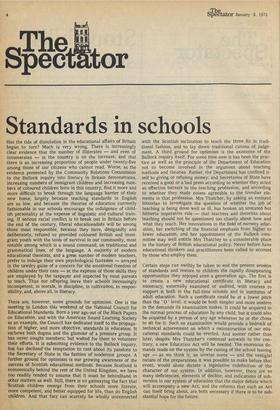Standards in schools
Has the tide of dissolution in the educational affairs of Britain begun to turn? Much is very wrong. There is increasingly clear evidence that the number of illiterates — and even of innumerates — in the country is on the increase; and that there is an increasing proportion of people under twenty-five among those of our citizens who cannot read. Worse, as the evidence presented by the Community Relations Commission to the Bullock inquiry into literacy in Britain demonstrates, increasing numbers of immigrant children and increasing numbers of coloured children born in this country, find it more and more difficult to break through the language barrier of their new home, largely because teaching standards in English are so low, and because the theories of education currently fashionable in our schools encourage the indulgence of childish personality at the expense of linguistic and cultural training. If serious racial conflict is to break out in Britain before the end of the century, liberal educationalists will be among those most responsible, because they have, designedly and deliberately, refused to provided coloured British and immigrant youth with the tools of survival in our community, most notable among which is a sound command, on traditional and grammatical lines, of the language. A majority of modern educational theorists, and a great number of modern teachers, prefer to indulge their own psychological fantasies — arrayed in the 'tawdry guise of a concern for the emotional freedom of children under 'their care — at the expense of those skills they are employed by the taxpayer and expected by most parents to teach. Thus our offspring leave their schools increasingly incompetent, in morals, in discipline, in cultivation, in responsibility, and, above all, in literacy.
There are, however, some grounds for optimism. One is the meeting in London this weekend of the National Council for Educational Standards. Born a year ago out of the Black Papers on Education, and with the American Sound Learning Society as an example, the Council has dedicated itself to the propagation of higher, and more objective, standards in education. It eschews both dogma and the glamour of a pressure group. It has never sought members; but waited for them to volunteer their efforts. It is submitting evidence to the Bullock 'inquiry, but has declined the temptation 'to rant about its passions to the Secretary of State in the fashion of modernist groups. A further ground for optimism is our 'growing a'wareness of the success of Scottish educational methods. Because Scotland is economically 'behind the rest of the United Kingdom, we have too readily tended to assume that it must be behindhand in other matters as well. Still, there is no gainsaying the fact that Scottish children emerge from their schools more literate, more competent, and better equipped for life, than do English children. And that fact can scarcely be wholly unconnected with the Scottish inclination to teach the three Rs in traditional fashion, and to lay down traditional canons of judgement. A third ground for optimism is the existence of the Bullock inquiry itself. For some time now it has been the practice as well as the principle of the Department of Education not to become involved in the argument about teaching methods and theories. Rather, the Department has confined itself to giving or refusing money; and Secretaries of State have received a good or a bad press according to whether they acted as effective bursars to the teaching profession; and according to whether they made noises agreeable to the trendier elements in that profession. Mrs Thatcher, by asking an eminent historian to investigate the question of whether the job of teaching is being done well or ill, has broken an unstated but hitherto imperative rule — that teachers and theorists about teaching should not be questioned too closely about how and what they teach. Her innovations in the 'field of nursery education, her switching of the financial emphasis from higher to lower education, and her appointment of the Bullock committee may well entitle Mrs Thatcher to a considerable place in the history of British educational policy. Never before have educational thinkers and practitioners been called to account by those who employ them.
Certain steps can swiftly 'be taken to end the present erosion of 'standards and restore to children the rapidly disappearing opportunities they enjoyed even a generation ago. The first is to create a new educational certificate in literacy and numeracy, externally examined or audited, with courses to support it both in the full-time schools and in institutes of adult education. Such a certificate could be at a lower pitch than the ' 0 ' level; it would be both simpler and more 'austere in the demands its examination makes. It could be acquired in the normal process of education by 'any child, but it could also be acquired by a person of any age whenever he or she chose to sit for it. Such an examination would provide a 'bedrock of technical achievement on which a reconstruction of our educational standards could be eredted. And sooner rather than later, despite Mrs Thatcher's continual avowals to the contrary, a new Education Act will be needed. The enormous demands made on the system by the raising of the school leaving age — as we think it, an unwise move — and the vestigial nature of the preparations it was possible to make before that event, would alone dictate a legislative redefinition of the character of our system. In addition, however, there are so many deficiencies, elements of decline, and indications of subversion in our system of education that the major debate which will accompany a new Act, and the reforms that such an Act can itself bring about, are both necessary if there is to be substantial hope for the future.

































 Previous page
Previous page